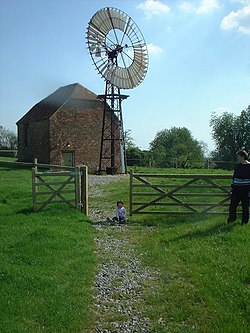Crux Easton Wind Engine
| Crux Easton Wind Engine | |
|
Hampshire | |
|---|---|
 Crux Easton Wind Engine | |
| Type: | Windmill |
| Location | |
| Grid reference: | SU42675634 |
| Location: | 51°18’17"N, 1°23’21"W |
| Village: | Crux Easton |
| History | |
| Built 1891 | |
| For: | The Earl of Carnarvon |
| Windmill | |
| Information | |
| Owned by: | Crux Easton Wind Engine Restoration Trust |
Crux Easton Wind Engine is windmill in Crux Easton in Hampshire built not to mill corn but as a wind pump. It was built by John Wallis Titt in 1891, and is today a Grade II listed building.[1]
The engine has been restored to working order.
History
The wind engine was erected for the George Herbert, 5th Earl of Carnarvon in 1891, and it pumped water from a well 410 feet deep.[2] It working life was brief though: it was last used in the 1920s.[3]
The sails were removed in the 1960s and placed in storage.[1] Restoration of the wind engine was undertaken by Hampshire Industrial Archaeology Society and Hampshire Mills Group with assistance from the British Engineerium, Hove for the Crux Easton Wind Engine Restoration Trust, with funds form Lottery funding and hard-pressed local taxpayers, and the Vodafone Charitable Trust.
After a delay in 2001 due to the foot-and-mouth crisis, the restored wind engine was officially opened on 25 September 2002.[4]
Description
Crux Easton wind engine is a Titt Simplex geared wind engine. It has a 20-foot diameter sail[3] mounted on a 35-foot hexagonal steel tower.[5] The annular sail has 48 blades, each one five feet long.[6] It is winded by a six blade fantail.[3]
The wind engine was primarily used for pumping water, but also drove a circular saw and a pair of millstones. The mill is recorded as being capable of producing eight to ten 20-stone sacks of flour a day.
Outside links
References
- ↑ Jump up to: 1.0 1.1 National Heritage List 1093065: Wind engine and former mill house, Ashmansworth
- ↑ Major, J Kenneth (1977). The Windmills of John Wallis Titt. The International Molinological Society.
- ↑ Jump up to: 3.0 3.1 3.2 "Restoring the Crux Easton Wind Engine". Hampshire Industrial Archaeology Society. http://www.hias.hampshire.org.uk/projects.htm.
- ↑ Jane Meredith (26 September 2002). "Crux Easton has the wind back in its sails". Newbury Weekly News. Archived from the original on 21 October 2012. https://web.archive.org/web/20121021234131/http://www.freewebs.com/windengine/article.htm.
- ↑ "Crux Easton Wind Engine". Society for the Protection of Ancient Buildings. http://www.nationalmillsweekend.co.uk/pages_wind/cruxeaston.html.
- ↑ "Crux Easton Wind Engine". Hampshire Mills Group. http://www.hampshiremills.org/Mills%20Crux%20Easton.htm.